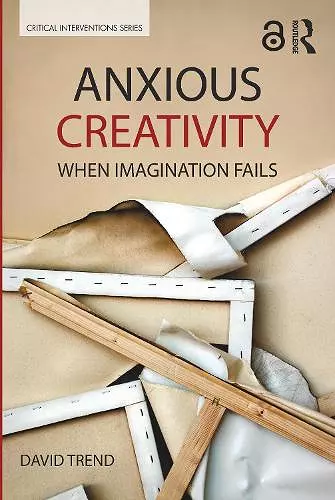Anxious Creativity
When Imagination Fails
Format:Paperback
Publisher:Taylor & Francis Ltd
Published:11th Sep '19
Currently unavailable, our supplier has not provided us a restock date
This paperback is available in another edition too:
- Hardback£165.00(9780367275068)

Creativity is getting new attention in today’s America––along the way revealing fault lines in U.S. culture. Surveys show people overwhelmingly seeing creativity as both a desirable trait and a work enhancement, yet most say they just aren’t creative. Like beauty and wealth, creativity seems universally desired but insufficiently possessed. Businesses likewise see innovation as essential to productivity and growth, but can’t bring themselves to risk new ideas. Even as one’s "inner artist" is hyped by a booming self-help industry, creative education dwindles in U.S. schools.
Anxious Creativity: When Imagination Fails examines this conceptual mess, while focusing on how America’s current edginess dampens creativity in everyone. Written in an engaging and accessible style, Anxious Creativity draws on current ideas in the social sciences, economics, and the arts. Discussion centers on the knotty problem of reconciling the expressive potential in all people with the nation’s tendency to reward only a few. Fortunately, there is some good news, as scientists, economists, and creative professionals have begun advocating new ways of sharing and collaboration. Building on these prospects, the book argues that America’s innovation crisis demands a rethinking of individualism, competition, and the ways creativity is rewarded.
"Anxious Creativity provides an important new perspective on the broader debate over the status of creativity in American society. The disciplinary frames for this debate are extremely diverse, including academic perspectives from educational theory, sociology and cultural studies, as well as a range of important public policy debates. In addressing this complex array of issues and political concerns Trend deploys an impressive range of references, including empirical studies, scientific research, journalistic reports and a myriad of sources in contemporary critical theory. The result is a unique set of commentaries on the question of creativity that will be of interest to scholars in an equally broad range of disciplines, as well as general readers. There are many books that focus specifically on new forms of participatory culture or media, crowd sourcing, etc. but no one has yet drawn this material into dialogue with broader debates around creativity and the "creative class," theories of intersubjectivity, the arts and public policy. This book is destined to make an important contribution to policy debates over creativity and higher education." —Grant Kester, University of California, San Diego, USA
"From the advent of paint-by-number artist’s kits to the publishing phenomenon of the adult coloring book to alleviate stress, from Apple’s "Think Different" campaign to Google’s DeepMind group, David Trend’s Anxious Creativity maps the vast social domains where creativity is promised as a means to sooth the anxieties of Americans and solve the economic and political crises of capitalism’s most recent twists and turns. Trend’s encyclopedic knowledge of art, cultural, social and political theory, as well as of the ever-multiplying discourses surrounding art and creativity, make Anxious Creativity a necessary book for anyone working at the intersections of these fields. But perhaps even more important, for anyone who has ever picked up a creativity self-help book (Big Magic, anyone? The Artist’s Way perhaps?) Anxious Creativity is a must read. Read this book and you’ll never be able to think of creativity in quite the same way again. That makes Anxious Creativity a formidable act of creativity in itself." —Micki McGee, Associate Professor, Sociology and American Studies, Fordham University, USA
"David Trend's Anxious Creativity: When Imagination Fails is deals with several topics that are crucially important at the moment. He explores the varieties of creativity discourses and the forces that foster and impede them, making a significant contribution to the sociological literature on these topics. The book will be very attractive to scholars in critical sociology, social and cultural studies in education, cultural theory, media studies, psychology, and technology studies." —Kenneth Saltman, University of Massachusetts, Dartmouth, USA; Author ofScripted Bodies: Corporate Power, Smart Technologies, and the Undoing of Public Education
ISBN: 9780367275099
Dimensions: unknown
Weight: 490g
326 pages